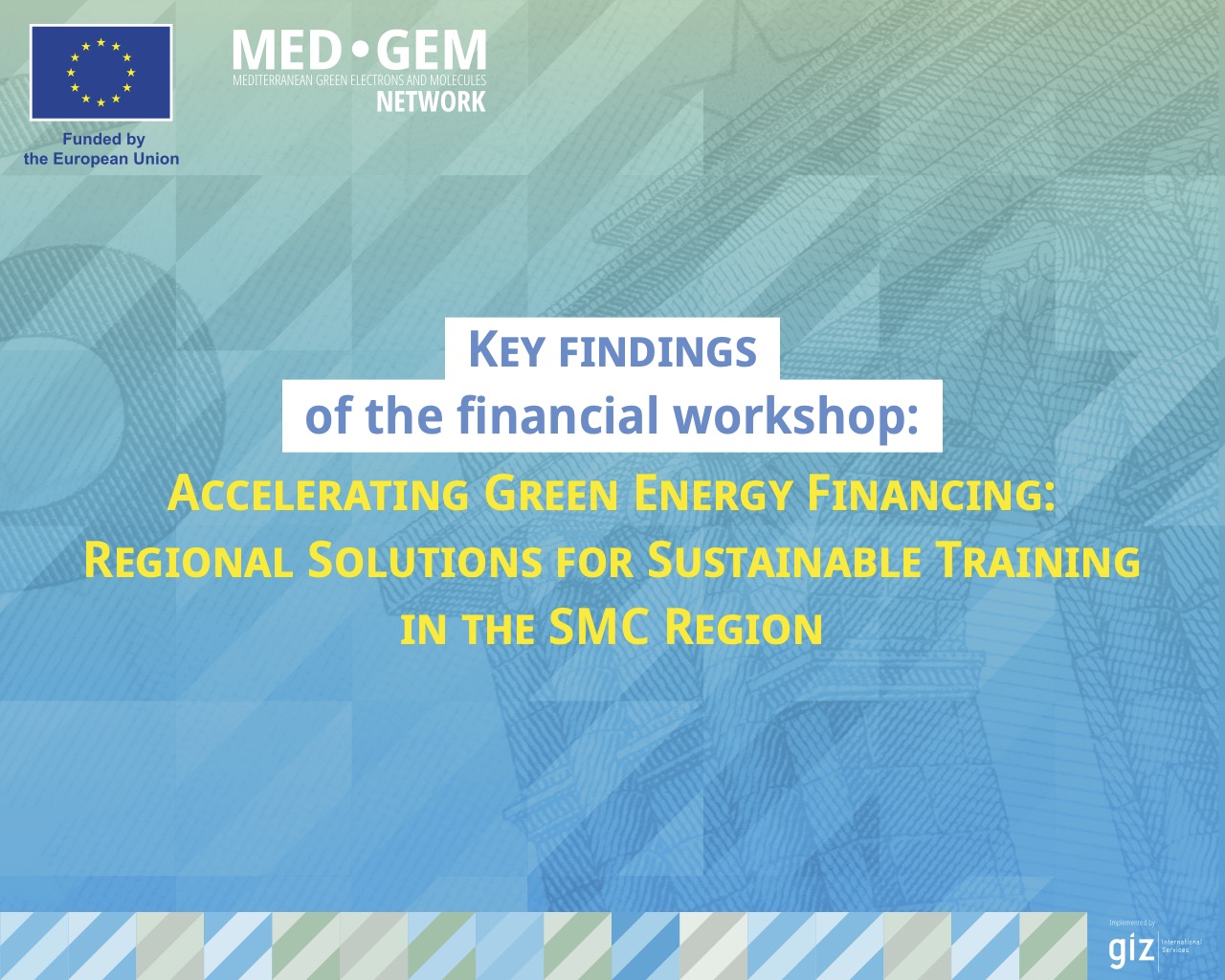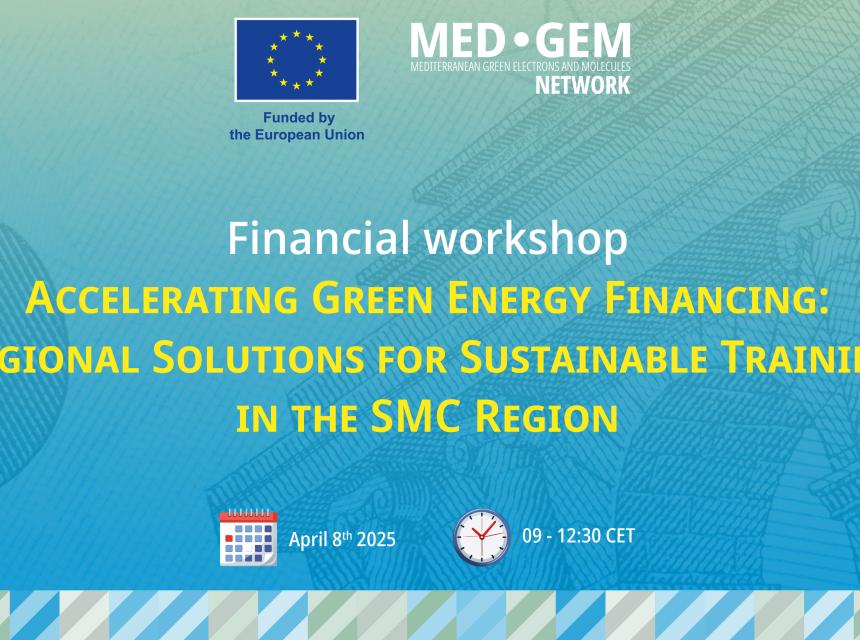Financing Green Hydrogen in the Mediterranean
Accelerating Green Energy Financing in the Mediterranean: Towards a Regional Pact for Renewable Hydrogen
April 8, 2025 – As part of the EU-funded MED-GEM Network, a high-level online regional workshop titled “Accelerating Green Energy Financing: Regional Solutions for a Sustainable Transition in the Southern Mediterranean” brought together key actors from policy, finance, and project development. Against the backdrop of rising global interest in renewable hydrogen and the strategic repositioning of EU-MENA cooperation, the event served as a pivotal moment to identify solutions for unlocking investment in green energy infrastructure. With a focus on bankability, regulatory frameworks, and regional collaboration, the workshop laid the groundwork for an actionable roadmap towards sustainable energy transitions in Southern Mediterranean countries.
▶️ Download the Keynote | 🔑 Discover the Key findings
A Strong Opening Call
The workshop opened with remarks by Milou Beerepoot, Programme Manager at DG MENA, who highlighted a striking paradox: “There is no shortage of available finance — the real challenge lies in the lack of bankable projects,” she stressed, calling for “a predictable, transparent and stable investment ecosystem.”
Frank Wouters, Director of the MED-GEM Network, emphasized the need for a shared vision: “The energy transition is not an end in itself — it must become a driver of regional cooperation and local value creation.”
Setting the Scene: Diagnosing Structural Barriers
Mustapha Taoumi (MED-GEM Renewable Energy Key Expert) and Samir Belrhandoria (Green Finance Specialist) set the analytical tone for the day. Taoumi described the disconnect between project design and local needs: “Many projects are export-oriented but disconnected from national development goals. We need hybrid models — locally anchored and globally competitive.” Belrhandoria added: “Technical design is not enough. Projects must be narratively strong and strategically de-risked to appeal to international financiers.”
Creating an Enabling Environment – Session 1
Moderated by Samir Belrhandoria, the first session featured Fulvio Capurso, Head of Unit at DG MENA, who presented the EU’s new investment tool — the Trans-Mediterranean Energy and Clean Tech Cooperation Initiative T-MED Platform: “We aim to create a lean investment platform that aligns political priorities, infrastructure projects, and blended capital, supporting the new Euro-Mediterranean Pact.”
Langa Oana (European Commission) reinforced this view: “Investors seek clarity. That means regulatory consistency, guarantees, and long-term visibility.”
Joyce Liyan (EIB Global) emphasized early-stage support: “Lack of standardization and technical assistance in the early phases significantly weakens a project's ability to attract funding.”
Pauline Raabe (H2Global) illustrated this with Egypt’s experience: “Success required contract innovation, offtake security, and constant institutional backing — these are not optional.”
From Theory to Practice – Session 2
The second session gave the floor to market players and developers, in a candid dialogue moderated by Belrhandoria. Marianne Klarsfeld (EBRD) underscored: “Without robust interconnections and storage, generation capacity alone is insufficient. Infrastructure must be tackled head-on.”
Mahmoud Shata (Scatec, Egypt) shared his strategy: “We leveraged existing industrial zones to reduce costs and fast-track financing access.”
Omar Alaoui Mhamdi (ACWA Power Morocco) concluded with a call for policy alignment: “Green hydrogen markets won’t materialize without harmonized frameworks and a clearly defined role for the private sector.”
Towards a Shared Action Agenda
In the wrap-up, Mustapha Taoumi synthesized the key insights: “This is not a question of appetite or capital — it’s about fragmentation. MED-GEM must act as the enabler of a regional strategy that is structured and aligned.” Samir Belrhandoria closed with a strategic message: “Investment starts with credibility. Pilots that are technically sound and institutionally supported will pave the way for scale.”

🔑 1. The main bottleneck is not funding availability, but a lack of bankable projects
Multiple speakers — including Milou Beerepoot, Joyce Liyan (EIB), and Pauline Raabe (H2Global) — highlighted a persistent mismatch between the abundance of available capital and the insufficient maturity of proposed projects. The lack of standardized documentation, preliminary technical structuring, and early-stage advisory support is a critical barrier to accessing financing, especially for capital-intensive ventures such as green hydrogen.
🔑 2. Clear and predictable regulatory frameworks are urgently needed at both national and regional levels
Langa Oana (European Commission) and Fulvio Capurso (DG MENA) emphasized the need for a stable legal environment, including hydrogen standards, transparent offtake mechanisms, and adapted fiscal policies. The absence of a regional coordination mechanism comparable to the North Sea Wind initiative hampers investment readiness.
🔑 3. The EU has a strategic role to play in de-risking green energy projects
Through instruments such as the T-MED Investment Platform and EFSD+, the European Union must act as an enabler by:
- offering guarantees and risk-sharing tools,
- supporting blended finance approaches,
- and promoting public-private partnerships at scale.
🔑 4. Pilot project models are key to unlocking market confidence
Flagship examples such as Ain Sokhna (Scatec, Egypt) and Chbika (Total Eren, Morocco) were praised for their replicability. These projects serve as blueprints for testing financial structures, engaging local banks, and proving market viability.
🔑 5. Local banks must be integrated into financing mechanisms
Omar Alaoui Mhamdi (ACWA Power) advocated for enabling local banks to access IFI renewable energy portfolios through refinancing schemes and first loss guarantees.
🔑 6. A “start small, scale fast” approach is widely supported
Across the board, developers and financiers agreed: building market trust starts with well-structured mid-sized pilot projects, which can be scaled up once viability is demonstrated.
🔑 7. Structured capacity-building is essential for long-term success
As emphasized by Mustapha Taoumi, governments in the region need targeted support to develop:
- realistic national roadmaps,
- training Programmes in financial structuring,
- and transparent project selection frameworks aligned with both industrial strategies and climate goals.

